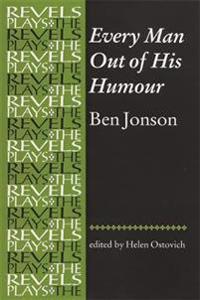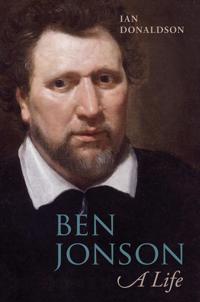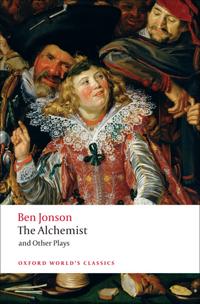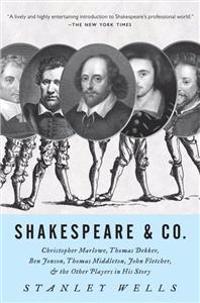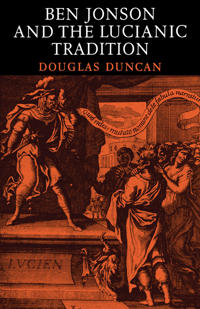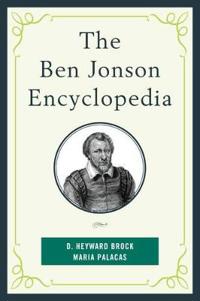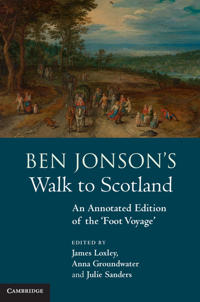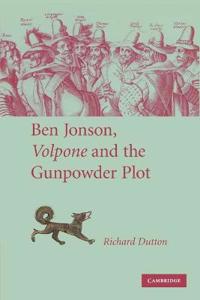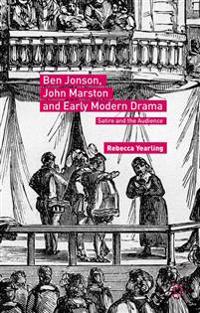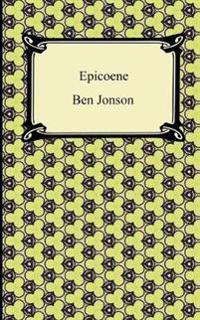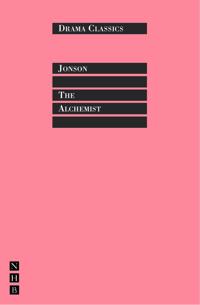Ben Jonson Volpone (Pocket)
avBen Jonson
ISBN: 9780300001396 - UTGIVEN: 1962-06Renaissance comedy, first performed in 1605. Includes complete text in modernized English, critical and explanatory notes and Introduction. From the Yale Ben Jonson edition.[...]
Every Man Out of His Humour (Pocket)
avBen Jonson, Helen (EDT) Ostovich, Ben Jonson
ISBN: 9780719078392 - UTGIVEN: 2008-06Despite its popularity when it first appeared in print in 1600, Every Man out of His Humour has never appeared as a single modern critical edition until now. The volume's introduction and annotations convey early modern obsessions with wealth and self-display by providing historical contexts and poi[...]
Alchemist and Other Plays, The: Volpone, or the Fox; Epicene, or the Silent Woman; the Alchemist; Bartholemew Fair (Inbunden)
avBen Jonson
ISBN: 9780198121503 - UTGIVEN: 1995-06-22Ben Jonson (Inbunden)
avIan Donaldson
ISBN: 9780198129769 - UTGIVEN: 201201Ben Jonson was the greatest of Shakespeare's contemporaries. In the century following his death he was seen by many as the finest of all English writers, living or dead. His fame rested not only on the numerous plays he had written for the theatre, but on his achievements over three decades as pri[...]
Oxford Student Texts: Volpone (Pocket)
avBen Jonson
ISBN: 9780199129577 - UTGIVEN: 2012-03-29One of a series, this one concentrating on Volpone by Ben Jonson.
The Alchemist and Other Plays (Häftad)
avBen Jonson
ISBN: 9780199537310 - UTGIVEN: 200809This edition brings together Jonson's four great comedies in one volume. Volpone, which was first performed in 1606, dramatizes the corrupting nature of greed in an exuberant satire set in contemporary Venice. The first production of Epicene marked the end of a year long closure of the theatres be[...]
Ben Jonson (Häftad)
ISBN: 9780199697472 - UTGIVEN: 2013-04Ben Jonson was the greatest of Shakespeare's contemporaries. In the century following his death he was seen by many as the finest of all English writers, living or dead. His fame rested not only on the numerous plays he had written for the theatre, but on his achievements over three decades as pri[...]
Complete Critical Guide to Ben Jonson, The (Övrig)
avJames Loxley
ISBN: 9780415222280 - UTGIVEN: 2001-10-25Next to Shakespeare, Ben Jonson is perhaps the most widely studied Renaissance dramatist. Very few students of literature or drama would not encounter Volpone or Bartholomew Fair in the course of their studies, and there has been a recent resurgence of interest in Epicoene , or the Silent Women amo[...]
Ben Jonson and the Lucianic Tradition (Häftad)
avDouglas Duncan
ISBN: 9780521129190 - UTGIVEN: 2010-02The challenge to the audience in Jonson's major comedies is usually seen as an extension of the provocative techniques of English Morality drama. In this lucid and penetrating study, Professor Duncan aims to supplement that view by suggesting a more sophisticated precedent for Jonson's methods in th[...]
Volpone (Pocket)
avBen Jonson
ISBN: 9780713654332 - UTGIVEN: 2003-02-01Volpone is part of the New Mermaid series of modern spelling, fully-annotated editions of English plays. Each volume includes a critical introduction, biography of the author, discussions of dates and sources, textual details, a bibliography and information about the staging of the play.[...]
The Ben Jonson Encyclopedia
ISBN: 9780810890749 - UTGIVEN: 2016-05A revised and expanded edition of A Ben Jonson Companion, this resource encapsulates the life, times, and work of Jonson. Entries in this volume include all of Jonson's writings, as well as key figures in his life, from contemporary writers to actors who performed in his plays. This new edition cont[...]
Ben Jonson's Walk to Scotland
ISBN: 9781107003330 - UTGIVEN: 2014-12At the heart of this book is a previously unpublished account of Ben Jonson's celebrated walk from London to Edinburgh in the summer of 1618. This unique firsthand narrative provides us with an insight into where Jonson went, whom he met, and what he did on the way. James Loxley, Anna Groundwater an[...]
Ben Jonson, Volpone and the Gunpowder Plot
ISBN: 9781107404755 - UTGIVEN: 2012-07Ben Jonson's Volpone is the most widely taught and commonly performed English Renaissance play outside of Shakespeare. However, the dramatic circumstances of its writing are little known. Jonson wrote the play very shortly after the Gunpowder Plot in 1605, an event in which he was personally involve[...]
Ben Jonson's Walk to Scotland
ISBN: 9781108438780 - UTGIVEN: 2017-10At the heart of this book is a previously unpublished account of Ben Jonson's celebrated walk from London to Edinburgh in the summer of 1618. This unique firsthand narrative provides us with an insight into where Jonson went, whom he met, and what he did on the way. James Loxley, Anna Groundwater an[...]
Ben Jonson, John Marston and Early Modern Drama
ISBN: 9781137563989 - UTGIVEN: 2016-01This book examines the influence of John Marston, typically seen as a minor figure among early modern dramatists, on his colleague and rival Ben Jonson. It argues that Marston's plays represent an experiment in a new kind of satiric drama and argues for their wider significance to the theatre of the[...]
Volpone (e-bok)
avBen Jonson
ISBN: 9781408144411Volphone's reverential prayer to his heaps of gold launches the sharpest, funniest play about money and morals in the 17th century - a play still wickedly relevant on the same topics four centuries later. Ben Jonson's comedy depicts selfishness thinly veiled by sanctimonious speeches, lust and posse[...]
The Alchemist (Pocket)
avBen Jonson
ISBN: 9781854592620 - UTGIVEN: 1997-09'The Alchemist' has been described as the greatest farce in the English language. It offers insights into London life in the early 17th century, and satirises and celebrates the confusions and anarchy of a fast-moving city world.[...]


